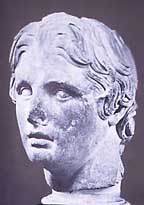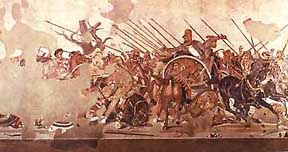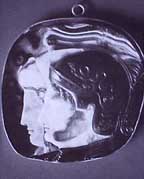|
Alexander's visit to the Oracle of Ammon at Siwa was, and still is considered as one of the most fascinating events of his reign. It was so widely publicized in antiquity, that king Lysimachos of Thrace, one of Alexander's successors, struck one of the first issues of posthumous silver tetradrachms in the name of Alexander, featuring the portrait of the Macedonian king on the obverse, bearing the horns of Ammon on his head. According to several ancient historians, Alexander claimed towards the end of his life that he was actually the son of Ammon/Zeus and not of Philip II of Macedon. We have no way of knowing whether such a claim was ever made by Alexander himself. We do know, however, that the Greeks were immensely skeptical about these rumours, because they generally opposed the deification of a mortal during his lifetime. These attitudes may be reflected centuries later in the twelfth Dialogue of the Dead by Lucian, the great satirical author of the Roman period (2nd century A.D.). In it, Alexander is portrayed as one among the dead of the Underworld. He meets Philip, his biological father, there who gently scolds and mocks him for denouncing his parentage and claiming that he was the son of Ammon. Accounts of Alexander's trip to the Oasis of Siwa have survived in Strabo's Geographica (Strabo, 17. C 814) and in Arrian. The latter claims that he drew his information mainly from Ptolemy and Aristoboulos who were present at Siwa at that time. One may wonder why Arrian did not consult Kallisthenes who was, after all, the official court historian of Alexander. This remains a mystery, but one may speculate that Kallisthenes was either already dead in 331 B.C. or that his account was full of the inevitable inaccuracies and flatteries of a court historian. On the other hand, Ptolemy wrote his history after Alexander's death, when he had already established his rule over Egypt and did not stand to profit from lying. Autoboulos also wrote after the death of Alexander. Arrian may also have chosen the accounts of Ptolemy and Autoboulos over that of Kallisthenes because the two former agreed with each other. It seems that other late historians, like Diodoros from Sicily (17.50.6; 51.4) and Plutarch, followed the tradition of these two early historians. The Oracle of Ammon is located in Libya. Although it was considered as one of the most prominent and reputed ancient oracles and enjoyed "international" reputation, no Egyptian pharaoh before Alexander had ever visited it. So why did Alexander make the honors? The answer is obvious if one takes into account the fact that the Libyan Oracle of Ammon was very well-respected in Greece. Ancient Greek authors ranked it third in importance after the sanctuaries of Zeus at Olympia, the home of the Ancient Olympic Games, and the sanctuary of Zeus in Dodona. Alexander set off for the Oracle of Ammon at Libya in 331 B.C. In order to reach it, he had to cross the desert and face many dangers. According to our sources, the chief priest of Ammon there welcomed Alexander by calling him "son of the God." He then allowed him access to the Adyton of the temple, a privilege usually reserved exclusively for the priests. Alexander's entourage was only allowed to enter the front yard and receive their oracles there. Only Alexander received his oracle personally in the Adyton. It is obvious that inaccurate rumours, gossip, and endless speculation on Alexander and his visit to the Ammoneion of the Libyan desert had mingled with the facts by the time that Plutarch wrote his biography of Alexander. Plutarch cites an unnamed source, according to which Alexander allegedly posed two questions to the priests of Ammon: 1) Whether any of Philip's assassins got away unpunished; and 2) whether he would conquer the entire world. To both these questions, the Oracle answered in the affirmative. Plutarch doubted the validity of his unnamed source and agreed with the reports that Arrian probably also used: that Alexander kept his discussion with the priests a secret, although he allegedly did write to his mother Olympias back to Macedonia promising to reveal his oracles to her alone upon his arrival back home (cf. Plutarch, Alexander, 27. 5-7; Arrian, 3.4.5). |
||||||||
 |
||||||||
|
Silver Tetradrachm featuring Alexander-Ammon struck by king Lysimachos of Thrace (301 281 B.C.). Obverse: Head of Alexander with the horns of Ammon. Reverse: Seated Athena holding victory with the legend: BASILEOS LYSIMAHOU. |
||||||||
 |
||||||||
|
of Alexander theGreat from Pergamon. Hellenistic period. |
||||||||
| Another interesting point that in Plutarch's account of Alexander's
visit to the Ammoneion of Siwa, the author relates that historians
before him had already challenged the accuracy of the alleged
proclamation of Alexander as son of Ammon by the priests and had
suggested their own interpretation of the disturbing rumors on
the Macedonian king's divinity. According to these unnamed sources,
the chief priest of Ammon who was not very fluent in Greek, instead
of correctly addressing Alexander as "O paidion" (=oh, my child!), he mistakenly called out instead: "O paidios" which could also be interpreted in Greek as "O pai Dios" (=oh, child of Zeus!). |
||||||||
 |
||||||||
|
Mosaic featuring the Battle of Issos. Roman copy of Hellenistic original. |
||||||||
|
Rational explanations did not appeal to the public, however. Our reader will remember the general evaluation of the Roman historian Curtius Rufus by modern scholarship as an unreliable source. This author relates a charming though fictitious story, according to which Philip II of Macedon was allegedly aware of the fact that Zeus was the biological father of Alexander (Rufus, 4.7.23-28). The chief god of the Greek Pantheon frequently visited Olympias in the night in the form of a snake. Philip II found out about this by peeping through the keyhole while his wife had intercourse with Zeus. His behaviour was considered sacrilegious by the gods, who then punished him by causing him to eventually lose the eye with which he watched Zeus's amorous adventures with the queen of Macedon! Curtius Rufus even stretches this story further by claiming that Alexander murdered Kleitos, his father's general, because the latter did not believe that his king was in reality the son of Zeus (Rufus, 6.9.17; 6.10.23; 8.7.13; 8.8.14; 8.5.5). Alexander the Great did proclaim his divinity towards the end of his life and ordered his subjects to worship him as god. It is also true that the Macedonian kings of the Argead dynasty who ruled before Alexander, traced their descent to the Greek mythical super-hero Heracles who was the son of Zeus. In that sense, it is true that Alexander claimed Zeus as his forfather, but it appears unlikely that he launched a propaganda campaign in order to promote any "blood" association between the king of Macedonia and Zeus/Ammon. Alexander reportedly sacrificed to Zeus before the Battle of Gaugamela for good luck, according to Plutarch who drew this information from Kallisthenes. This act, however, was not out of the ordinary, as Zeus was, after all, the chief god of the Greeks who frequently sacrificed to him at times of war for good luck (cf. Plutarch, Alexander, 33.1; Tarn, Alexander, p. 352 ff.; for the importance of Zeus see Xenophon, Apologia Sokratous). And in his long speech to his army which threatened mutiny at Opis, Alexander repeatedly mentioned Philip II as his father (cf. Arrian, Anabasis, 7.9). Select Modern Bibliography on Alexander's Visit Elizabeth Kosmetatou (author), 1998. All rights reserved. |
||||||||
 |
||||||||
|
|
||||||||